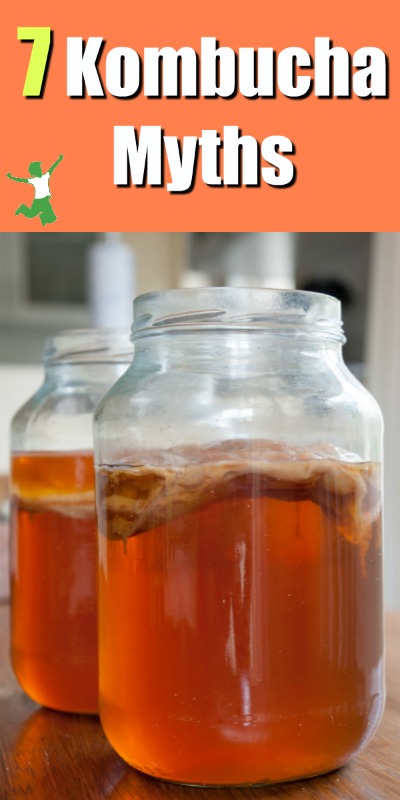The seven biggest kombucha myths regarding this healthful, traditional beverage which are costing consumers money or scaring them away from trying it and experiencing its many benefits.
I first started brewing the fermented tea known as kombucha in 2001 when I was pregnant with my second child. It’s a good thing I ignored the kombucha myths that were circulating at the time else I never would have tried it at all!
Sipping small amounts on a daily basis proved very helpful in relieving some of the hip and low back pain I was experiencing at the time. So much healthier (and tastier!) than popping a couple of ibuprofen or Tylenol, wouldn’t you agree?
Since then, this traditional beverage that likely has its roots in China around 200 BC has become a modern-day phenomenon with well over a million homes regularly brewing this probiotic and enzyme-rich beverage for the benefit of themselves and their families.
In response to the boom in kombucha home brewing, dozens of bottled commercial brands are now available for purchase at farmers’ markets, healthfood stores, food co-ops, and even supermarkets. Having these commercial versions readily available when out of town has made healthy traveling so much easier, don’t you think?
As with any fast-growing trend, a number of myths have continued to circulate with new ones cropping up too. While some of these kombucha myths are harmless, some are actually costing people money (for example, cultures that don’t work) or discouraging them from trying this healthful beverage altogether. This is a shame and completely unnecessary, which is why I thought an article busting the most common kombucha myths would be helpful.
This list of the most common myths below was reproduced with permission from the sensational Big Book of Kombucha by my friends Hannah Crum and Alex LaGory. I have watched Hannah and Alex painstakingly and lovingly put this book together over the past couple of years, and I can tell you, they have put everything they have into it in order to create a world renowned resource for years to come.
I am not exaggerating when I say that this book is a must for your cookbook shelf. It contains literally everything you ever wanted or needed to know about kombucha, SCOBYs, brewing, flavoring, and just enjoying the myriad of health benefits of consuming fermented tea. In addition to all the fascinating as well as practical information, numerous recipes for flavorful and medicinal variations of both brewed and bottled booch are included along with gorgeous pictures to inspire you
I hope you are able to pick up a copy for yourself or as a gift soon!
Kombucha Myths Busting
* Reproduced with the permission of Storey Publishing from The Big Book of Kombucha by Hannah Crum and Alex LaGory.
The fairly recent resurgence of interest in traditional methods of food cultivation and preparation and the attendant fascination with fermenting and brewing make kombucha nearly irresistible. When ignorance and excitement combine, however, factual information often becomes jumbled with the fantastical and the fearful. As knowledge of kombucha has grown and more information has become available, old myths have been outgrown but unfortunately not always discarded.
While mostly harmless, misinformation masquerading as fact too often confuses the homebrewer and disrupts proper brewing techniques. Here are some kombucha myths we’d like to bust for good.
Kombucha Is a Mushroom
This widely held belief most likely arises from the obvious resemblance of the SCOBY to a large mushroom cap. The kombucha culture, as you know by now, is in fact a symbiotic culture of bacteria and yeast. Although the taxonomy for kombucha has not yet been formalized, mushrooms are fungi and so are yeast, so in that regard kombucha cultures and mushrooms are in the same family. But they are distant cousins, not siblings.
Adding to the confusion is that some of the old names in other languages called it a “mushroom.” When those terms were translated into English, “kombucha mushroom” became a catchy name for the culture.
Metal Will “Kill” Kombucha
Due to kombucha’s powerful detoxifying properties, dire warnings to avoid even a few seconds of metal-to-kombucha contact are overblown. Brief contact with something like a strainer or a pair of scissors will not lead to a toxic SCOBY or tainted brew. However, kombucha really should not be brewed in anything but glass. Brewing in stainless steel bowls is a risk for leeching carcinogenic nickel into the brew.
SCOBYs Should Be Refrigerated
This nasty nugget is widespread and often passed along by well-meaning brewers with the explanation, “So they won’t rot” or “It just puts them to sleep.” In fact, SCOBYs never “go bad” when properly stored. In cold temperatures the bacteria and yeast, which keep the SCOBY healthy and protect the brew, become inactive and are unable to put up a defense against mold. When a SCOBY that has been refrigerated is activated, the first batch or two may (or may not) turn out okay, but eventually, mold is likely to appear in the brew. (See page 157 for more about refrigerated cultures.)
Dehydrated SCOBYs Are Viable
The issues are the same as with refrigeration; only this time the bacteria and yeast are too weak from dehydration to protect against mold. If the culture is deprived of the protective pH of the starter liquid, which kills harmful organisms on contact, it becomes vulnerable to mold, and the bacteria in kombucha do not perform well after dehydration. Additionally, it can take up to six weeks to rehydrate a dried-out culture before attempting the first batch. No point in wasting the time for a likely-to-fail experience.
Kombucha Makes the Body Acidic
The body is a complex and marvelous organism, masterful at maintaining health through homeostasis. Significant shifts of internal pH indicate illness or, rarely, impending death. In order to maintain the correct pH at all times, our bodies employ several detoxification and buffering systems — such as the lungs, kidneys, and digestive system — to process acidic ash, the residue generated by the consumption of certain foods and also present in the body as the by-product of metabolic processes.
There is a debate over whether so-called acid/alkaline diets are beneficial to health, but we do know that when food is digested in the gut, its components leave residues that are either acid-forming or alkali forming. The body suffers from ill effects at either extreme, so the key, according to proponents of these diets, is to strive for balance rather than focusing on consuming only one type of food or another.
So what about drinking kombucha? Won’t the low pH make the body more acidic (something you’ve probably been told to avoid)? The answer is no. While it is true that kombucha has a low pH (2.5–3.5), the residue (ash) is alkaline-forming rather than acidic, and has an effect similar to lemon juice and apple cider vinegar.
Brewing Kombucha at Home Is Unsafe
When brewing kombucha at home, you pretty much have only one major issue to worry about: mold. And mold is obvious — it’s the blue, black, or white fuzz growing on top of the culture. If you see it, simply toss the brew, just like you would a moldy piece of bread, cheese, or fruit. Otherwise, if you have a quality culture and strong starter liquid, and you follow the proper procedures, success is virtually guaranteed.
Kombucha Is a Cure-All
Let’s get this straight once and for all: Kombucha is not a panacea. In fact, it doesn’t cure anything! Kombucha gradually detoxifies the body so that the immune system can function properly. Think of it as a filter cleaner, where the filter is your liver. Kombucha is an adaptogen. Adaptogens are plants or compounds that satisfy three important criteria — they are nontoxic, they are nonspecific (they work on the whole body, rather than a particular part or system), and they help the body maintain homeostasis. This means that if you need to lose weight, kombucha may help you to do so, and if you need to gain weight, kombucha may help with that also.
Have any of these kombucha myths cost you money or kept you from trying it for yourself before? If so, now you know the facts straight from Hannah Crum, the Kombucha Mamma herself!









Someone warned me that kombucha causes inflammation. Her holistic doctor had her stop drinking it. Is this true? Inflammation?
I have Lyme disease and need to stay away from sugar and caffeine. When I got diagnosed I quit drinking Kombucha and really miss it. I cheated recently and felt so much better that I want to ignore the advice to stay away from it. Do you feel the sugar and caffeine still linger enough to cause an inflammatory response?
I prefer Joon/Jun drink over Kombucha. They’re in the same category of drink type, and Joon is more sprightly fresh in character, at least with comparing what I’ve tried at the local ‘health food store’. Kombucha relatively is more ‘dank’.
Hello, nice article! I have been home brewing for a couple years now with great success. However, I am currently pregnant and have been warned not to drink my homebrew due to possible alcohol content. I realize some people believe a little alcohol while pregnant is okay but the copious research I have read says no. Anyway, is there always alcohol in home brew or a way to avoid it?
Thanks!